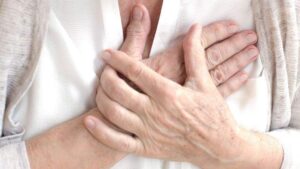Heart disease describes a variety of conditions that affect your heart.
The Mayo Clinic places heart disease under an umbrella of different types of heart or cardiovascular diseases, including blood vessel diseases, such as coronary artery disease; heart rhythm problems (arrhythmias); and heart defects one is born with (congenital heart defects), among others.
Early signs of heart disease depend on what type you have. And, these diseases and symptoms may be different for men and women. For instance, men are more likely to have chest pain; women are more likely to have other symptoms along with chest discomfort, such as shortness of breath, nausea and extreme fatigue.
Heart disease is a serious condition, no matter how it presents itself. Knowing the risks and warning signs can help you keep an eye out for any problems.
Constant fatigue. Some illnesses, and even certain medications, can cause fatigue. However, if you are constantly fatigued or consistently have trouble sleeping, you could be experiencing an early sign of heart failure (a condition in which the heart fails to pump well) or coronary artery disease.
Unexplained aches or pains. Discomfort in the center of the chest that can feel like uncomfortable pressure, squeezing, fullness or pain that comes and goes could be an early sign of heart disease. However, for many, the pain is not always felt in the chest. Sometimes it is felt in the shoulders, arms, back, jaw or abdomen.
Shortness of breath. Certain respiratory problems may cause you to feel breathless. However, unexplained shortness of breath that occurs with small amounts of activity, such as walking up a flight of stairs, could indicate heart trouble. Most cases of shortness of breath are due to heart or lung conditions. Your heart and lungs are involved in transporting oxygen to your tissues and removing carbon dioxide, and problems with either of these processes affect your breathing.
You should visit your doctor if you experience any unexplained shortness of breath. Breathing difficulty that comes on suddenly is persistent or interferes with your daily activities should be evaluated by a medical professional.
Swollen feet or ankles. Edema, or swelling, occurs when fluid is trapped in your body’s tissues. It can result in the swelling of your lower legs, ankles, and feet and could be an early sign of a heart problem. The swelling could also be caused by kidney disease, liver failure, eating too much salty food, or a side effect of some drugs. If you or someone you know develops leg pain and swelling that won’t go away, see your doctor. Persistent leg pain and swelling can indicate a blood clot deep in your vein (deep vein thrombosis, or DVT).
Irregular or rapid heart palpitations. For many, most heart palpitations are harmless. They may be caused by anxiety, hormonal changes, medication, excessive caffeine or dehydration. But sometimes palpitations indicate a heart problem. Heart palpitations, along with shortness of breath, dizziness, chest pain, and fainting, could mean a more serious heart condition in which you should see your doctor immediately.
There are some risk factors for heart disease that can’t be changed – such as family history, sex or age – but for the most part, heart disease can be prevented or treated with healthy lifestyle choices. This guide from Family Living Today provides great insight on proactive ways to stay healthy and improve the condition of your heart, including healthy eating and exercise tips and ways to look after both your mental and physical health.
Want to learn more about improving your heart health? Check out some of our past blog posts on this subject:
7 Heart-Healthy Tips for Seniors
Small Changes Can Lead to a Lifetime of Heart Health
Are you a Heart Attack Waiting to Happen?.
If you have questions about your heart health or you are considering making significant lifestyle changes that could impact your health, always consult with your doctor.
SOURCE:
Mayo Clinic: www.mayoclinic.org
Health Line: www.healthline.com
American Heart Association: www.heart.org
